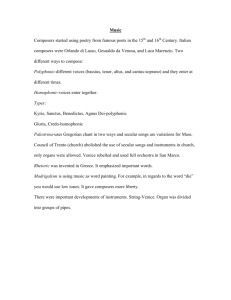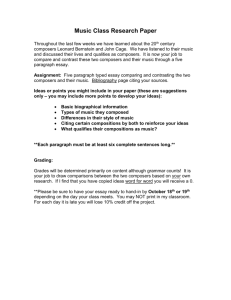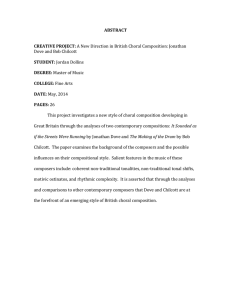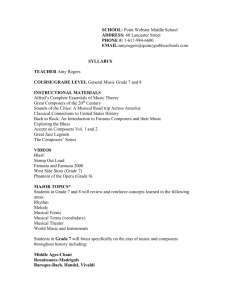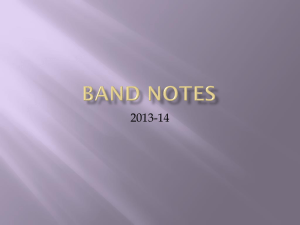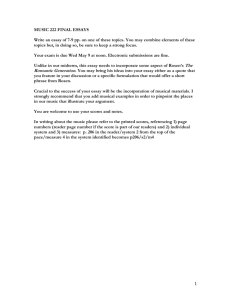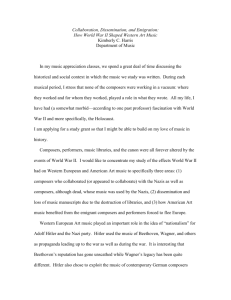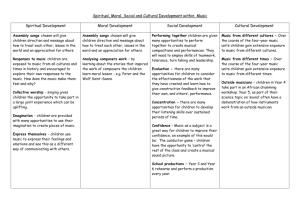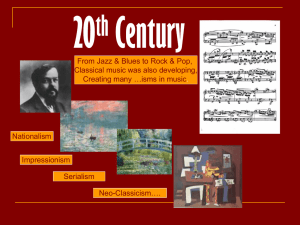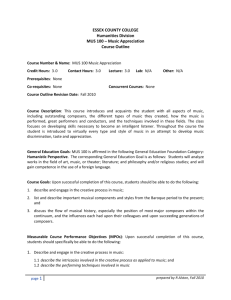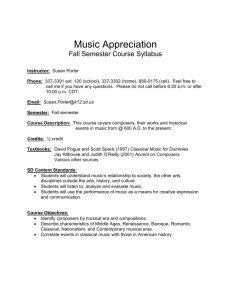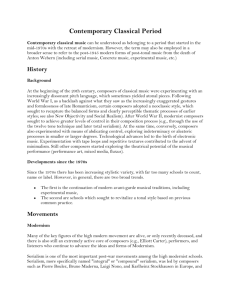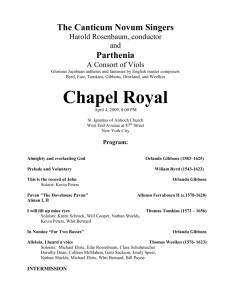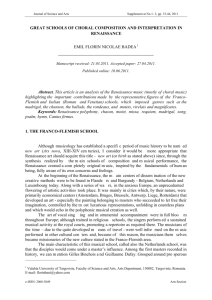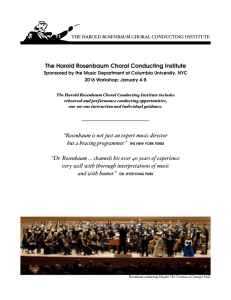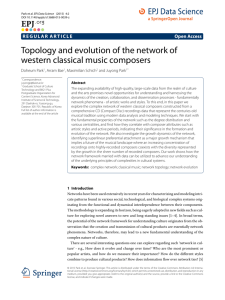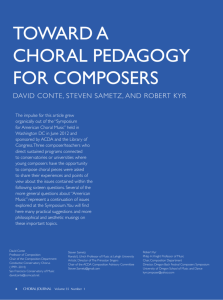NYTimes 6-2-08
advertisement
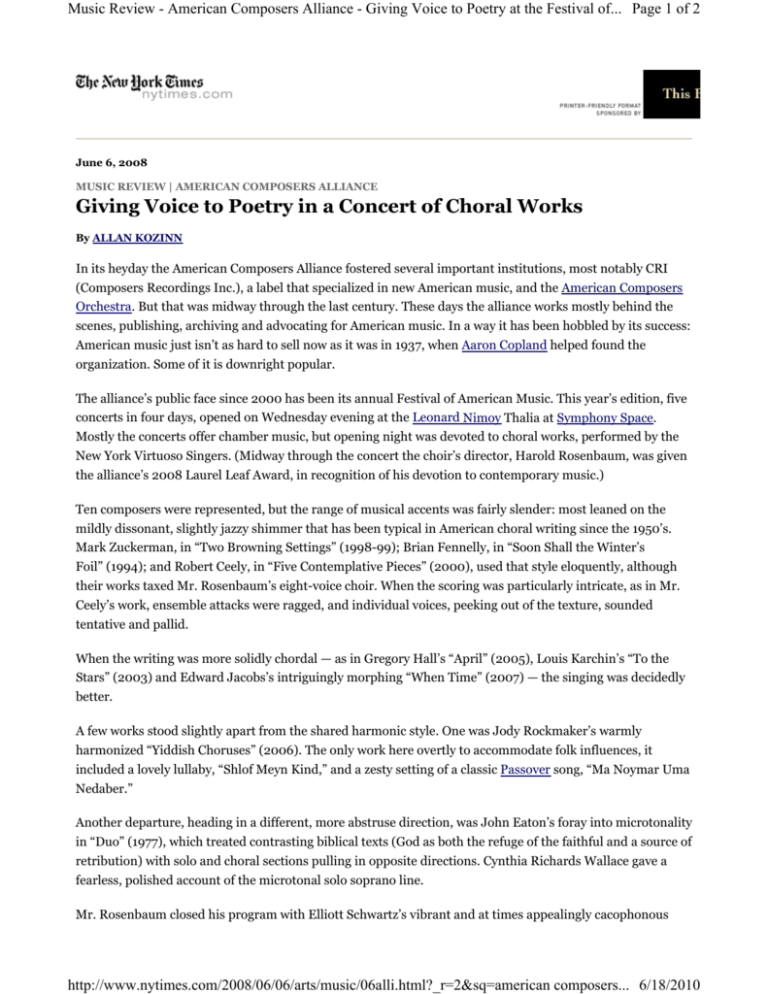
Music Review - American Composers Alliance - Giving Voice to Poetry at the Festival of... Page 1 of 2 June 6, 2008 MUSIC REVIEW | AMERICAN COMPOSERS ALLIANCE Giving Voice to Poetry in a Concert of Choral Works By ALLAN KOZINN In its heyday the American Composers Alliance fostered several important institutions, most notably CRI (Composers Recordings Inc.), a label that specialized in new American music, and the American Composers Orchestra. But that was midway through the last century. These days the alliance works mostly behind the scenes, publishing, archiving and advocating for American music. In a way it has been hobbled by its success: American music just isn’t as hard to sell now as it was in 1937, when Aaron Copland helped found the organization. Some of it is downright popular. The alliance’s public face since 2000 has been its annual Festival of American Music. This year’s edition, five concerts in four days, opened on Wednesday evening at the Leonard Nimoy Thalia at Symphony Space. Mostly the concerts offer chamber music, but opening night was devoted to choral works, performed by the New York Virtuoso Singers. (Midway through the concert the choir’s director, Harold Rosenbaum, was given the alliance’s 2008 Laurel Leaf Award, in recognition of his devotion to contemporary music.) Ten composers were represented, but the range of musical accents was fairly slender: most leaned on the mildly dissonant, slightly jazzy shimmer that has been typical in American choral writing since the 1950’s. Mark Zuckerman, in “Two Browning Settings” (1998-99); Brian Fennelly, in “Soon Shall the Winter’s Foil” (1994); and Robert Ceely, in “Five Contemplative Pieces” (2000), used that style eloquently, although their works taxed Mr. Rosenbaum’s eight-voice choir. When the scoring was particularly intricate, as in Mr. Ceely’s work, ensemble attacks were ragged, and individual voices, peeking out of the texture, sounded tentative and pallid. When the writing was more solidly chordal — as in Gregory Hall’s “April” (2005), Louis Karchin’s “To the Stars” (2003) and Edward Jacobs’s intriguingly morphing “When Time” (2007) — the singing was decidedly better. A few works stood slightly apart from the shared harmonic style. One was Jody Rockmaker’s warmly harmonized “Yiddish Choruses” (2006). The only work here overtly to accommodate folk influences, it included a lovely lullaby, “Shlof Meyn Kind,” and a zesty setting of a classic Passover song, “Ma Noymar Uma Nedaber.” Another departure, heading in a different, more abstruse direction, was John Eaton’s foray into microtonality in “Duo” (1977), which treated contrasting biblical texts (God as both the refuge of the faithful and a source of retribution) with solo and choral sections pulling in opposite directions. Cynthia Richards Wallace gave a fearless, polished account of the microtonal solo soprano line. Mr. Rosenbaum closed his program with Elliott Schwartz’s vibrant and at times appealingly cacophonous http://www.nytimes.com/2008/06/06/arts/music/06alli.html?_r=2&sq=american composers... 6/18/2010 Music Review - American Composers Alliance - Giving Voice to Poetry at the Festival of... Page 2 of 2 “Two Watterson Poems” (2004), with light percussion accompaniment, and Steven R. Gerber’s “Sessions of Sweet Silent Thought” (2003-4), a set of five richly harmonized settings of Shakespeare sonnets about love and death (mostly death). In these the choir’s performance was beyond reproach. The Festival of American Music 2008 runs through Saturday at the Leonard Nimoy Thalia at Symphony Space, Broadway at 95th Street; (212) 864-5400, symphonyspace.org. Copyright 2008 The New York Times Company Privacy Policy Search Corrections RSS First Look Help Contact Us Work for Us Site Map http://www.nytimes.com/2008/06/06/arts/music/06alli.html?_r=2&sq=american composers... 6/18/2010
